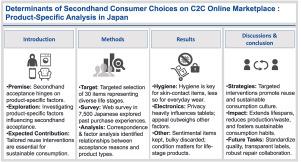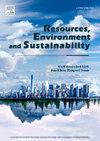C2C在线市场中二手消费者选择的决定因素:日本特定产品分析
IF 7.8
Q1 ENVIRONMENTAL SCIENCES
引用次数: 0
摘要
本研究假设影响二手产品接受度的因素的相对重要性因产品类型而异。这一前提是通过一项日本消费者调查来探讨的,该调查分析了影响采用和拒绝的因素,以及30种不同产品类型的关键接受标准。调查结果揭示了人们对二手物品的微妙态度。对于直接接触皮肤的物品来说,卫生和清洁是最重要的,而对于平板电脑来说,隐私问题则是最重要的。值得注意的是,与童年有关的物品往往是出于情感价值而不是重复使用。由于认为再使用程序不方便,笨重的家具和小型电子设备经常被储存或丢弃。本研究确定了在线C2C市场的两个消费者接受因素:(1)产品状况和功能保证;(2)产品信息和市场吸引力。根据产品类型,消费者会优先考虑不同的因素:对卫生敏感的产品需要考虑这两个因素,日常穿着对其中任何一个都不太敏感,电子产品强调产品信息和吸引力,而生命阶段的产品优先考虑条件和功能。这些不同的偏好突出了特定产品策略的重要性,这可以培养消费者的信任,促进强劲的二手交易。最终,通过建立信任、简化交易和承认不同的产品需求,企业和政策制定者可以促进二手产品的再利用,并推动二手产品的广泛采用,形成可持续的消费体系。本文章由计算机程序翻译,如有差异,请以英文原文为准。

Determinants of secondhand consumer choices on C2C online marketplace: Product-specific analysis in Japan
This study hypothesizes that the relative importance of factors influencing the acceptance of secondhand products varies by product type. This premise was explored through a Japanese consumer survey analyzing factors influencing both adoption and rejection as well as key acceptance criteria across thirty diverse product types. The results revealed nuanced attitudes toward secondhand items. Hygiene and cleanliness were paramount for items with direct skin contact, while privacy concerns dominated for tablets. Notably, childhood-related items were often kept for sentimental value rather than being reused. Bulky furniture and small electronics were frequently stored or discarded due to the perceived inconvenience of reuse procedures. The study identified two consumer acceptance factors in online C2C markets: (1) the product condition and functional assurance and (2) product information and market appeal. Consumer decisions prioritized different factors depending on product type: hygiene-sensitive items required consideration of both factors, everyday wear showed less sensitivity to either, electronics emphasized product information and appeal, and life-stage products prioritized condition and functionality. These diverse preferences highlight the importance of product-specific strategies, which can foster consumer trust and facilitate robust secondhand transactions. Ultimately, by building trust, streamlining transactions, and acknowledging diverse product needs, businesses and policymakers can promote reuse and drive widespread adoption of secondhand products towards a sustainable consumption system.
求助全文
通过发布文献求助,成功后即可免费获取论文全文。
去求助
来源期刊

Resources Environment and Sustainability
Environmental Science-Environmental Science (miscellaneous)
CiteScore
15.10
自引率
0.00%
发文量
41
审稿时长
33 days
 求助内容:
求助内容: 应助结果提醒方式:
应助结果提醒方式:


